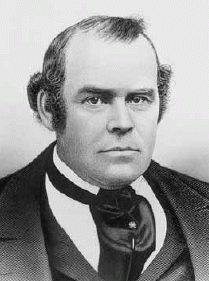
 |
| History of Parley P. Pratt, Utah |
| Courtesy of Utah History Encyclopedia. (Links Added) |
 |
| Picture Courtesy of Wikipedia |
|
Parley Parker Pratt was born in Burlington, Ostego County, New York, on 12 April 1802, the middle son of five born to Jared and Charity Pratt. At a young age he was required to work to help sustain the family, which limited his formal education. His mother taught him to read the Bible at home, where, he claimed, Christian virtues were taught by example. He became a voracious reader. When he was sixteen and boarding with his father's sister, he had his last opportunity for formal schooling. He married Thankful Halsey on 9 September 1827. He cleared some land and built a small cabin in Amherst, Lorain County, Ohio, where they resided. After hearing Sydney Rigdon preach, he joined the Society of Reformed Baptists and felt constrained to sell his worldly goods and become a missionary. He transferred his missionary zeal to the Church of Jesus Christ of Latter-day Saints, into which he was baptized 1 September 1830. Pratt preached at every opportunity, and served missions from England to the Pacific Islands to Chile, as well as in many areas of the United States and in several counties of Utah. Chosen by Joseph Smith as one of the first Mormon apostles, Parley P. Pratt endured imprisonment, persecution in Missouri, the trials of the exodus from Nauvoo, and the challenges of settling the Great Basin area. He became a significant thinker and writer of his time and culture. His wife, Thankful, and seven children preceded him in death; one wife divorced him; but he was survived by ten wives and twenty-two children. In the winter of 1847, he sailed Utah Lake and explored Utah Valley, then went westward by horseback into Cedar and Tooele valleys, coming back into the Salt Lake Valley between the Great Salt Lake and the Oquirrh Mountains. A general convention in March 1848 chose Pratt as one of ten to draft the first constitution of the provisional state of Deseret. In the summer of 1848, Pratt explored Big Kanyon Creek, now Parleys, for the purpose of building a road to provide easier access into the valley. In July 1849 his crops failed and he began making the road. In November 1849, after suspending work on his road for a season, Pratt was called to head an exploring company of fifty men to southern Utah and to counsel Brigham Young on promising areas for new settlements. Pratt gave to the legislative assembly optimistic forecasts for settling the present sites of Richfield, Marysvale, Parowan, Cedar City, Washington, Santa Clara, Mountain Meadow, Beaver, and Payson. His company brought back samples of iron ore, coal, and other minerals. He provided specific information on weather, soil conditions, water, forestation, and other topographical conditions. He opened his toll road in 1850, and during its first season of operation collected $1,500 from California-bound gold seekers and others. He left for a mission to Chile the following year, and the road largely fell into disuse. Today, what was then the "Golden Pass Road" is the Interstate 80 freeway through Parleys Canyon, a major scenic route into the valley, and one that services numerous communities east of Salt Lake City. Pratt was re-elected to the legislative assembly of the State of Deseret in the winter of 1850, returned again by unanimous vote in August 1854, and in 1855 served as chaplain of the council as it sat in assembly in Fillmore. He also served as a regent for the University of Deseret. Pratt was called on a mission to the southern states and while he was on this mission, a lawsuit was filed by one Hector McLean, who accused Pratt of causing an estrangement between himself and his former wife, Eleanor. Although Pratt was exonerated by the court, McLean and two accomplices pursued Pratt to Alma, Arkansas, where they fired at and stabbed him. He died on 13 May 1857 and was quietly buried at what is now Fine Springs, Arkansas. See: Parley Parker Pratt, Autobiography of Parley Parker Pratt (1985); Parley Parker Robinson, The Writings of Parley Parker Pratt (1952); Peter L. Crawley, The Essential Parley P. Pratt (1990). |
| Donna T. Smart |
|